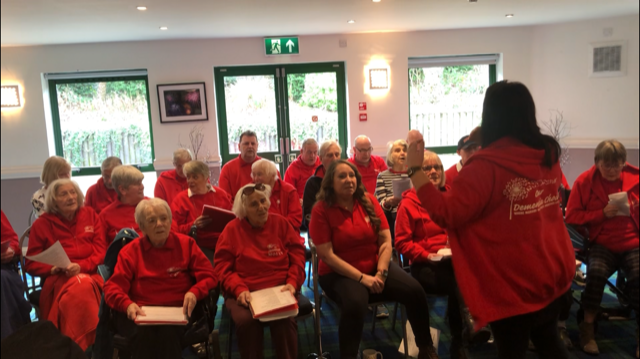
TV’s Our Dementia Choir highlights the crucial support of General Practice
On Tuesday 28 February, a Dietitian from the local GP team joined a rehearsal of Our Dementia Choir in Calverton to provide advice and support about food, drink and nutrition.
Janice Barratt is from Arrow Primary Care Network, which is a group of local GP surgeries who work together to provide new specialist services. Janice completed her doctoral research on how family Carers manage eating and drinking problems in people with Dementia living at home.
With 30 singers, 30 carers and over 15 volunteers participating, the visit provided an excellent opportunity to signpost support for physical aspects related to Dementia, like changes to food and drink preferences. Janice works for Primary Integrated Community Services (PICS), a local GP-owned healthcare provider of services for NHS patients, and whose Social Prescribing Link Workers have already been supporting members of the Choir.
Our Dementia Choir started out as a BBC TV programme five years ago, fronted by Nottingham-born actress Vicky McClure, 39, who stars in Line of Duty. It became a charity 18 months ago Chaired by Vicky and run by Karen Bonser, 56 of Bilsthorpe, Nottinghamshire. Karen’s husband Mick has been living with Dementia and joined the Choir when it first started out.
“There is more happening than the singing”, Karen explains, “Carers are talking to each other, socialising and making friendship groups. We’re not a helpline and we aren’t medical professionals, but there is nobody more aware or who has more dealings with Dementia than a group of Carers. Our support network is key.
“Things can happen quickly with Dementia. One day your loved one will be able to eat with a knife and fork, the next day they can’t. What do you do? You can’t keep making it up all the time. You need that professional support and guidance and a little pat on the back now and again that you are doing things right.
“So we work with a variety of medical professionals to be able to signpost to the right support, including Consultants, Social Prescribers, and now Dietitians.”
Helen Eastwood, 47 is an unpaid carer for her mum and a paid carer for her 27 year old son. Helen shared an insight she says many feel: “There’s a lot of information from many places, but you have to know what you’re looking for.”
Helen’s mum, Jean Eastwood, 74, who is living well with Dementia added: “When things change, I want to talk with someone about how to manage that, and things change all the time. I have a Dementia check-up next week, so I’ll ask to see a Dietitian. If you don’t ask, you don’t get.” Helen adds: “But some don’t ask.”
Karen talked with Janice during the rehearsal, while her husband was singing. “I told Janice that Mick has started eating food in a certain order. I’m worried that he’s taking a long time, the food is cold and doesn’t taste good on it’s own or becomes uninspiring. Janice was really reassuring. She said that if he’s enjoying it and he’s not changing weight, it’s not a problem that I need to worry about. As long as he has time to eat it, the change is not a problem. I was worried this was the start of him not being able to swallow and loosing weight. Janice explained that she’s worked for more than 10 years in Dementia care and seen many people with Dementia who haven’t lost weight or gained weight. It’s not inevitable at all, and every person is different.
Karen shares her positive experience of being supported: “Mick and I had a Social Prescriber assigned to us quite early doors, who signposts us to organisations who can support, whether it be Alzheimer’s Society, community activities, or free gym passes from the local council. Quite often it is simple, but you don’t know what you don’t know.
“GP surgeries have a big part to play in making sure people get access to support they need. There is a lot of physical side to dementia than people think. It’s not just ‘I’ve lost my keys, I’ve lost my phone and I don’t know what your name is.’ As people progress through the disease they find out there is more to it that they can get support with, like Speech and Language Therapists, Specialist Nurses and Occupational Therapists. That’s where referrals to support groups, Social Prescribers and specialists come in. We want to help those families who feel like they have to cope behind closed doors. We want to learn from their experiences, as well as share our music and support.”